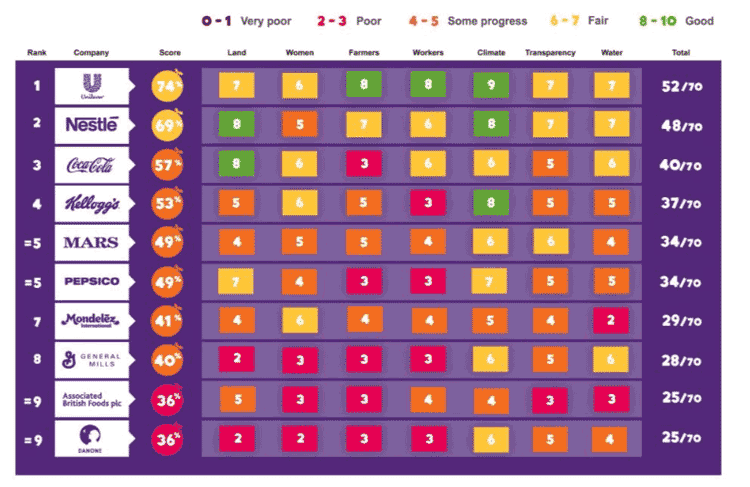Three years ago, Oxfam, an international hunger and poverty relief organization, began its "Behind the Brands" initiative, designed to put pressure on large global food companies to make improvements in their sustainability and green supply chain practices.
An important vehicle in the Oxfam campaign is an annual report that rates the 10 largest food companies in terms of actions and practices across seven categories, which are: land, women, farmers, workers, climate, transparency and water. The report for 2016 has just been issued.
Oxfam said its efforts have resulted in some 700,000 "actions" by consumers encouraging consumer goods companies to become more sustainable, including targeted on-line social media to off-line mobilizations, email petitions and more.
Each company is given a score of 1 to 10 on each of the seven categories, based on mining of publicly available information such as might be included in annual corporate or sustainability reports. The scores across the seven individual categories are then summed for a total score and thus ranking. There is no real way to check or validate the Oxfam scoring system.
Oxfam said there is mixed news from the analysis. On what it sees as a positive, nine of the "Big 10" global food and beverage companies have improved their ratings by at least 10% in three years since Oxfam began keeping score.
However, "While the large companies themselves have generally made important improvements, they have a lot more work to do in their extended supply chains," the report notes. "The companies have made significant new commitments over the past three years to improve social and environmental standards in their vast supply chains. But the companies must now ensure that their suppliers actually change their practices in line with the commitments made."
And less there is any doubt about where this is headed, the report also notes that "to accelerate the transformation towards a more sustainable food system, the companies must go further and adopt new business models in their supply chains to ensure that more of the power and the value reaches the farmers and workers who produce their ingredients."
It adds that "We will also continue to push these and other companies and government elites to go further, and more radically shift power within the food system towards those who grow our food and those who consume it."
All that said, and again with the proviso that it is not at all "transparent" how the scores are calculated, here is the scorecard for the top 10 for 2016:

Unilever comes out tops in the rankings, while Danone finishes in in tenth place.
It concludes by noting that "we will judge our success on whether power is shifting to farmers, workers, communities and women."
The full 2016 report is available here: The Journey to Sustainable Food
What do you think of the this Oxfam approach? Are the ratings fair? Let us know your thoughts at the Feedback button below.

|